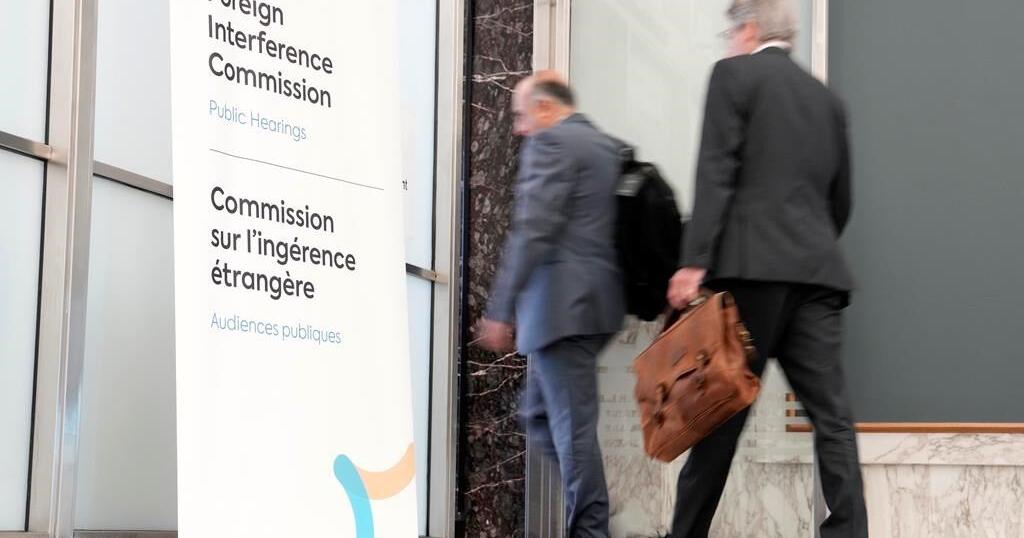OTTAWA – Members of targeted diasporas in Canada are calling for greater awareness of the foreign threats they face as well as more robust protections that could save lives.
Representatives of various communities told a federal inquiry Wednesday of the numerous challenges of fighting foreign meddling and repression.
The commission of inquiry’s latest hearings are focusing on detecting, deterring and countering interference from abroad.
Katherine Leung, a policy adviser with Hong Kong Watch, said police duly take notes and extend thanks when someone reports being surveilled, threatened or harmed by a person acting on behalf of a foreign regime.
“But for some members of the Hong Kong community that I’ve spoken to, this is where the story ends. There’s no followup, no indication of progress and no sense of safety or closure,” Leung said.
“For these individuals, the silence that follows can be as unnerving as the initial threat. The lack of followup leaves them feeling vulnerable, uncertain if their case is being pursued and no safer than before they reached out for help.”
Regular communication would reassure victims that their cases are being taken seriously and help build confidence in law enforcement and encourage future reporting, she said.
Moninder Singh, an advocate for the Sikh community, said there’s been a failure by agencies to share information quickly and concisely when lives are at risk.
Singh said policies at the local, national and international levels should be aligned, with a clear protocol in responding to threats from foreign powers.
He also called for stronger cybersecurity measures to protect people.
“When we are given these warnings to our lives, we are often told that we can be tracked via our phone, GPS and other things,” Singh told the inquiry. “Yet, we have no education, no ability to actually protect ourselves. So education around cybersecurity for individuals that are facing these types of threats is paramount.”
There is a critical need to enhance the awareness of key institutions like the judiciary, RCMP and Canadian Security Intelligence Service about the activities of foreign agents linked to oppressive regimes, said Farzaneh Fard of the Iranian Justice Collective.
“Comprehensive education and specialized training are essential to equip these institutions to effectively identify and address threats,” she said.
Judges, prosecutors and immigration officials must be educated about tactics such as the use of false identities and forged documents, Fard said.
Dedicated teams should be set up within the RCMP and CSIS to focus on foreign meddling and threats, she added.
In addition, she advocated a national campaign to educate the public about risks including exploitation of Canada’s legal and immigration systems by hostile entities.
“At the moment, members of our community who are targets of foreign interference or are aware of the presence of Iranian regime officials in Canada struggle to convey this information to the appropriate authorities,” Fard said.
She said establishing a well-publicized method of contacting the authorities with relevant information can protect members and quickly alert security agencies.
Teresa Woo-Paw, who sat in the Alberta legislature from 2008 to 2015, told the inquiry that every Canadian should be concerned about foreign meddling in electoral processes and democratic institutions.
But she also said members of the Chinese community are putting aside thoughts of running in elections because they don’t want their loyalty publicly questioned.
Woo-Paw, chair of the Canadian Race Relations Foundation since 2018, said “quite a number of people” have told her of their aspirations to serve in public office.
“Almost all of them are saying, ‘But this is not the time.'”
She said these fears will have a generational impact with fewer Chinese Canadians elected to public office.
She said some also worry they will be accused of trying to interfere in an election if they donate to a nominee’s campaign, or that they might cause trouble for the candidate.
Woo-Paw was among members of the Chinese community who told the inquiry of unintended chilling effects from the current public controversy over foreign interference.
Anonymous leaks to the media of intelligence documents about alleged Chinese interference in Canadian electoral processes sparked calls for the federal inquiry that is now underway.
Montreal student Wawa Li told the inquiry there’s a fixation on foreign meddling fuelled by authorities and opportunistic politicians, leading to a sense of hysteria.
“I am against foreign interference, and I hope the government takes action if it exists, but not at the expense of the community,” she said.
The commission of inquiry also provided insights Wednesday into its broader consultation process.
In addition to the voices heard at public hearings, the inquiry has gathered over 145 written submissions from the public. It has also received more than 460 responses to date to a questionnaire.
The inquiry has also held 22 meetings with 105 members of the following diasporas: Chinese, Eritrean, Falun Gong practitioners, Hong Kong, Iranian, Russian, Sikh, Tamil, Tibetan, Tigrayan, Ukrainian and Uyghur. Summaries of these meetings will be published at a later time, with some information redacted to respect privacy.
Among the suggestions to date:
— Increase government transparency about foreign interference risks and responses;
— build collaborative relationships between diaspora communities and government, including law enforcement agencies;
— improve cultural knowledge and proficiency for government representatives interacting with victims of foreign interference and transnational repression;
— public education, awareness and supports related to foreign threats;
— media literacy resources and anti-racism education for the public;
— and better efforts to publicly fact-check information related to common disinformation topics.
This report by The Canadian Press was first published Oct. 2, 2024.
